In Vitro Fertilization (IVF)
In vitro fertilization (from the Latin word extra — over, outside and the Latin word corpus-body, that is, fertilization outside the body, abbreviated IVF) is an high reproductive technology used for infertility. This procedure is also called “in-vitro fertilization”,” artificial fertilization”.
The first successful IVF attempt was carried out in 1977 in the UK, as a result of which the first well-known girl, Louise brown, was born. The girl was born absolutely healthy, today she has her own children born naturally. Few people know, but a few years after her, her sister was born, also with the help of IVF.
Since then, the principles of treatment and extraction of eggs from the ovaries have undergone significant changes. Today, the risks of complications associated with ovarian stimulation and oocyte aspiration are minimized.
What is IVF and for who is it to?
IVF is indicated for those couples who suffer from infertility and other methods of treatment did not bring the expected result.
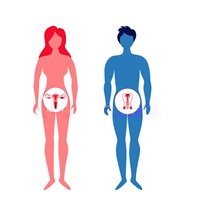
In turn, infertility is a condition in which it is impossible to get pregnant with regular sexual activity without contraception for one year. After 35 years-for 6 months or less.
The causes of infertility for which it is necessary to make IVF:
- Tubal infertility (complete or partial obstruction or removal of the fallopian tubes due to ectopic pregnancy, inflammatory diseases of the tubes). In this condition, there is a narrowing or complete occlusion of the fallopian tubes, which prevents the movement of the egg along it. The fertilized egg does not enter the uterus and pregnancy does not occur.
- Endocrine factor. In this case, the processes associated with ovulation are disrupted, which are manifested by chronic anovulation or insufficiency of the luteal phase of the woman. Anovulation usually occurs when violations in the pituitary-hypotolamus-ovary chain, when the production of FSH and LH is disrupted, which does not lead to a timely change of phases of the menstrual cycle. The menstrual cycle can be regular(21-37 days).
- Insufficiency of the luteal phase of a woman’s cycle is expressed in a violation or decrease in the production of progesterone, which leads to the inferiority of the second phase of the cycle, in which pregnancy either does not occur or is interrupted at an early stage.
Usually such disorders are successfully corrected by ovulation stimulation(for example, clomiphene citrate, gonadotropins), with or without insemination. Most often, the effect occurs within 6 months. But if the pregnancy is not received within a year, then this disorder is an indication for IVF. In IVF, superovulation is stimulated, in which many follicles mature and the probability of pregnancy is much higher.
- Endometriosis. this is a hormone-dependent gynecological disease, which is characterized by the growth of tissue similar to the endometrium, outside of it: in the ovaries, fallopian tubes, in the walls of the uterus, on the peritoneum and other organs. Clinical manifestations depend on the location of the pathological process. Common symptoms – pelvic pain, pain during sexual life, smearing dark spotting before and after menstruation. Endometriosis is treated with hormonal drugs or surgery together with hormone therapy. If pregnancy does not occur after treatment for 6 months, IVF is indicated.
- Age factor. Over 40 years of age, it is quite difficult for a woman to get pregnant due to a natural decrease in ovarian reserve and low quality of eggs. If it is impossible to get oocytes during ovarian stimulation or their quality is too low, IVF with donor oocytes is indicated.
- PCOS (polycystic ovary syndrome). This is an endocrine hormonal disease in which the functional work of the ovaries is disrupted . Often, this also increases the amount of male sex hormones in the blood, the manifestation of which is. Hirsutism(growth of hair on the face, chest, and other areas typical for men), obesity, acne, lack of menstruation or prolonged absence of it, excess weight. Often with weight loss and correction of hormone levels, ovulation stimulation with clomiphene or hormonal drugs, it is possible to get a pregnancy. If long-term treatment with these methods does not give results, this pathology is an indication for the IVF procedure.
- Infertility of unclear etiology. After a full medical examination, its causes were not revealed.
- Hereditary and genetic diseases in one of the spouses. In this case, IVF with PGD ( preimplantation genetic diagnostic) is indicated to identify healthy embryos and weed out the affected ones.
Male factors for IVF are the following reasons:
- Varicocele. This is varicose veins of the testicle and spermatic cord in men. According to statistics, 40% of male infertility cases are caused by varicocele.
Varicose veins cause an temperature increase in the scrotum, which leads to a violation of sperm production (normally it is slightly lower than body temperature). Spermogram indicators are violated. Varicocele is treated with conservative and operative methods. If the treatment does not lead to results, IVF with ICSI is indicated.
- Severe disorders of spermatogenesis, during which there is reduced or greatly increased the volume of semen, reduced sperm count, motility and morphology of sperm or no sperm.
Along with indications for IVF, there are also contraindications:
- severe somatic pathology that is dangerous to a woman’s health and life (heart disease, liver failure, Crohn’s disease, ulcerative colitis, kidney failure, severe diabetes);
- malformations abnormalities of the uterus that make it impossible to start or carry a pregnancy;
- malignant diseases of any localization;
- benign ovarian formations( IVF is possible after treatment);
- mental disorder.
- benign formations of the uterus and ovaries requiring surgical treatment (fibroids, polyps, cysts)
- any infectious and chronic diseases in the acute stage. After stabilization of the condition, IVF is possible.
What tests are necessary before IVF?
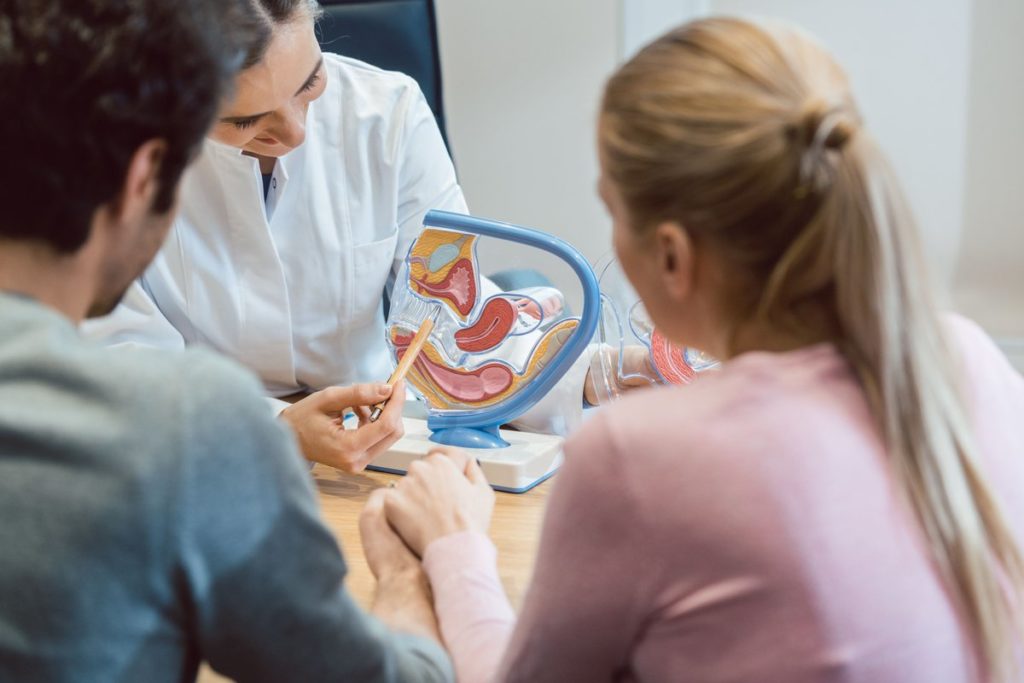
The reproductologist selects the examination plan for each patient individually, but there is also a nesessary list of laboratory tests that all patients must pass without exception. The list of tests differs slightly in each country. European Society of Human Reproduction and Embryology recommends to make nest tests:
- hormonal profile (AMH, FSH, LH, Progesterone, Estradiol, Prolactin, TSH, testosterone, etc.).
- Immunoglobulin for rubella, cytomegalovirus, and Toxoplasma viruses.
- Hepatitis B, C, Syphilis, HIV.
- General clinical and biochemical tests.
- PAP test
- Mammography for patients over 40 years of age.
- Ultrasound of the pelvic organs.
- Men: hepatitis B and C, Syphilis, HIV, spermogram.
How is IVF done?
So, after a full medical examination and a conclusion about the need for IVF, and if there are no contraindications, the patient and the doctor begin treatment.
IVF consists of several stages:
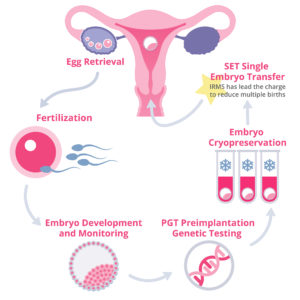
- Stimulation of superovulation. This stage begins with 2-3 days of the menstrual cycle and lasts 8-12 days. Every day, the patient needs to make injections of hormonal drugs that are selected individually (medicine, dose). Injections are made in the lower abdomen, subcutaneously. In this way, the ovaries grow and Mature all the follicles that are in them. The dynamics of their growth is necessarily monitored by ultrasound and laboratory monitoring every 2-3-4 days. When the size of the follicles reaches the desired size ( 18-20 mm), an injection of the final maturation of oocytes is prescribed 36 hours before the puncture – the trigger of ovulation. Most often, these are HCG medications. Then comes the 2nd stage.

2. Aspiration of oocytes. The surgery is performed most often in the morning, fasting, with intravenous anesthesia. With the US control, to the sensor of the US device puts a special thin and sharp needle, with which through the vagina makes a puncture to the ovary, sucks the contents of all follicles, which is collected in a sterile test tube and immediately transferred to the embryologist in the laboratory.

. The procedure lasts 10-20 minutes, depending on the number of follicles. The patient is under anesthesia and does not feels any pain.
After the procedure, the patient rests for 2 hours in a comfortable room, and then can go home.
In parallel, husband collects sperm in a specially designated room. The sperm is also immediately transferred to the laboratory for test and processing.
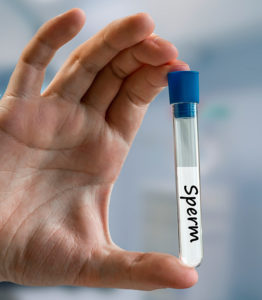
- the 3rd stage of IVF is fertilization of the received eggs with the sperm of the husband (or donor). Fertilization can be classic, when there are no violations of sperm indicators and a sufficient number of eggs is obtained. Sperm and eggs are placed in the special tube and natural fertilization occurs, which occurs in the body of a woman, that is, in the fallopian tubes.
If the eggs are 4 or less, the number of spermatozoa is low, their mobility is reduced and there are many pathological forms-fertilization is performed by ICSI. With this method, the embryologist selects the strongest and ” correct ” spermatozoa, immobilizes them with a special solution to catch them(because, as you know, they are very, very fast) and enters, injects them into the egg.
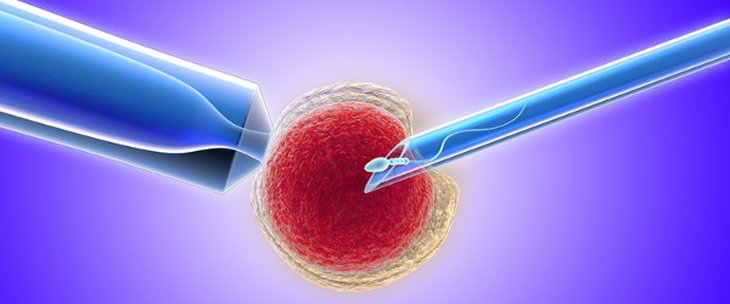
Then, during 3-4-5 days, the embryologist monitors the development of fertilization and growth of embryos, evaluates their development.
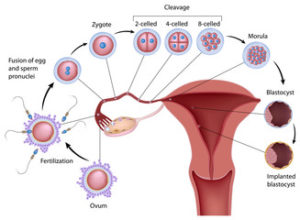
- The final stage of IVF is the embryo transfer into the uterus. The procedure is performed on 3-4-5 days after fertilization, there is no need for anesthesia, because the procedure is painless. Under the control of ultrasound, 1 or 2 embryos are transferred to the uterine cavity with a thin catheter. In rare cases, 3 embryos are transferred( if the embryos are not of very high quality, the age of the woman is older than 43 years). If there are more embryos of good and excellent quality, they are frozen.
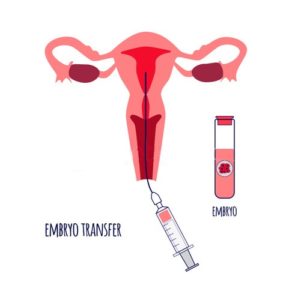
At this stage, the IVF procedure ends.
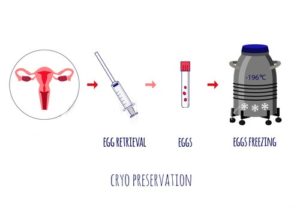
The patient is allowed to go home, given the necessary recommendations, prescribed hormonal support, physical and sexual rest. After 12-14 days, patient needs to make a blood test for HCG to determine whether a pregnancy has occurred or not. In case of pregnancy, the patient is in touch with the doctor and follows all recommendations. At about 8-9 weeks, she is registered for pregnancy management at her place of residence or at any other gynecological Department where she wishes.
Like any medical procedure, IVF has a number of complications that could happen during treatment:
- The ovarian hyperstimulation syndrome. During ovarian stimulation, their excessive response to stimulation is noted, they produce a large number of hormones that can cause pathological reactions. Most often, this syndrome occurs in a mild form, which is manifested by an increase in the size of the ovaries, which causes painful sensations in the lower abdomen. Treatment for a mild form of hyperstimulation is not required, it is enough to follow a protein diet and drink plenty.
In severe forms of hyperstimulation, there is a large accumulation of fluid in the abdomen, lungs, respiratory and heart failure. Hyperstimulation of moderate and severe require treatment in a multidisciplinary hospital under the supervision of anaesthesiologists and reanimatologists.
To avoid this complication, it is important to choose the correct dose of the drug for stimulation, carefully monitor the patient’s condition, regularly conduct ultrasound research and laboratory tests.
- Complication during the operation to extract eggs-bleeding in the case of injury to the vessels in the pelvis. This complication is extremely rare, but if the patient has a history of surgery, ovarian abnormality, adhesions, varicose veins-the risks increase. In this case, it may be necessary to make a laparoscopy or laparotomy and the repair of bleeding vessels.
- Ectopic pregnancy. This complication during IVF is also possible. Rarely, but with good passable of the fallopian tubes, the embryo from the uterine cavity can migrate to the tube and take root there. Ectopic pregnancy also requires immediate surgery and removal of the tube.
Doctors with extensive experience in IVF can control all stages of treatment and prevent possible complications, so that the procedure for the patient was as comfortable as possible and brought the expected result. Our Israeli specialists have extensive experience in IVF (more than 20 years), with them you can be safe for your life and health. Trust the BIRTH IVF clinic and make your long-held dream come true!

